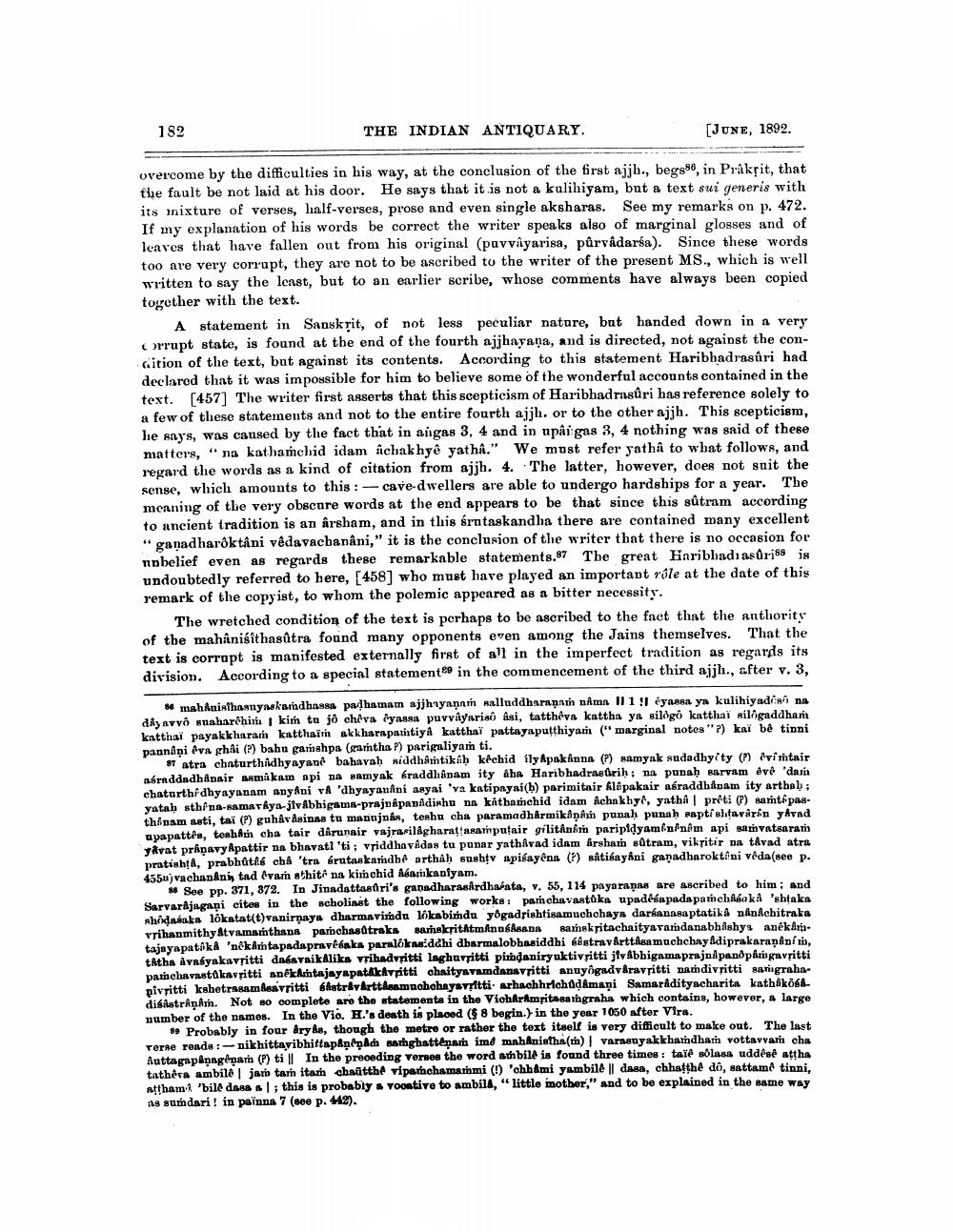________________
182
THE INDIAN ANTIQUARY.
[JUNE, 1892.
overcome by the difficulties in his way, at the conclusion of the first ajjh., begg80, in Prakrit, that the fault be not laid at his door. He says that it is not a kulihiyam, but a text sui generis with its onixture of verses, lalf-verses, prose and even single aksharas. See my remarks on p. 472. If my explanation of his words be correct the writer speaks also of marginal glosses and of leaves that have fallen out from his original (pavvayarisa, pûrvådarśa). Since these words too are very corrupt, they are not to be ascribed to the writer of the present MS, which is well written to say the least, but to an earlier scribe, whose comments have always been copied together with the text.
A statement in Sanskrit, of not less peculiar nature, but handed down in a very Orrupt state, is found at the end of the fourth ajjhayaņa, and is directed, not against the conGition of the text, but against its contents. According to this statement Haribbadrasûri had declared that it was impossible for him to believe some of the wonderful accounts contained in the text. (457] The writer first asserts that this scepticism of Haribhadrasûri has reference solely to a few of these statements and not to the entire fourth ajjh. or to the other ajjh. This scepticism, he says, was caused by the fact that in aigas 3, 4 and in upâi gas 3, 4 nothing was said of these matters,“ na kathamchid idam kchak hyê yatha." We must refer yatha to what follows, and regard the words as a kind of citation from ajjh. 4. The latter, however, does not suit the sense, which amounts to this : -cave-dwellers are able to undergo hardships for a year. The meaning of the very obscure words at the end appears to be that since this sûtram according to ancient tradition is an arsham, and in this srutaskandha there are contained many excellent " ganadharôktani vêdavacbanani," it is the conclusion of the writer that there is no occasion for nobelief even as regards these remarkable statements.87 The great Haribhadi asûri88 is undoubtedly referred to here, [458] who must have played an important role at the date of this remark of the copyist, to whom the polemic appeared as a bitter necessity.
The wretched condition of the text is perhaps to be ascribed to the fact that the anthority of the mahâniśithasútra found many opponents even among the Jains themselves. That the text is corrapt is manifested externally first of all in the imperfect tradition as regards its division. According to a special statement in the commencement of the third ajjh., after v. 3,
mahAnilhasnynskarndhas8 pahamam ajjhnyaņnn alluddharana nima II 1!1 éyassa ya kulihiyada na då avvô buaharchiv kim tu jo chava yassa puvvâyrriso asi, tatthéva kattha ya silogó katthai ilgaddhan katthai payakkhara katthaitin akkharapatitiya katthai pattayaputthiyati (" marginal notes"?) kai bê tinni pannapi Ova ghAi (P) bahu gamshpa (gartha P) parigaliyan ti.
$7 atra chaturthidhyayanê bahavah siddhantikih kêchid ily Apakanna (?) samyak sudadhyity (?) évimtair asrnddadhanair asmakam api na samyak sraddhinam ity aha Haribhadrastrih: na punaḥ sarvam évê 'dan chaturthfdhyayanam anyáni v 'dhyayanini asyai 'va katipayai(h) parimitair klipakair asraddhivam ity arthol); yatah sthina-samaraya-jivabhigama-prajnápanidishu na kåthamchid idam Achnkhya, yath proti (?) samt pasthinam asti, tai () guhåv åsinas tu manujnás, teshu cha paramadharmikapan punah punah rapti ahtavaran yarad apapattès, teaháin cha tair darunair vajrasilágharat asampuțair gilitânim paripidyamininam api samvatsaram yarat primavy Apattir na bhavatl'ti; vsiddhavadas tu punar yathavad idam Arshan stram, vikritir na tivad atra pratishta, prabhatha chá 'tra brutaskandhe arthah sushtv apibayêna (?) satibayini ganadharoktini vêda(see p. 4550) vachanann tad var athit na kinchid Asarkaniyam.
88 See pp. 371, 372. In Jinadattasfiri's ganadharasárdhabata, v. 55, 114 payaraņas are ascribed to him; and Sarvarajagani cites in the scholiast the following works: panchayastaka upadéśapada parchalaki 'shtaka shida aks lõkstat(t)vanirnaya dharmavimdu lókabimdu yogadrishtisamuchchaya darśanasaptatika nånachitraka vihanmithy Stvamamthana parchasdtraks samakritAtmånabissna samskritachaityaramdanabhashyz anekarataj yapatika 'nekintapadapravébaka paralókasiddhi dharmalobbasiddhi sastravarttásamuchchay Adiprakaranání, tAtha Avasyakavritti dabavaikAliks vrihadvritti laghuvritti pidaniryuktivsitti jabhigamaprajnapangpi gavritti pathchavastákavritti anekArtajayapata chvritti ohnitysvamdans vritti anuyógadvaravritti naudivritti sariigrahaDivritti kahetrasamleavritti Astray Art Aamushohaysviitti: arhachhrichą Amani Samaridityacharita kathk06disastranArn. Not so complete are the statements in the Vichar Ampitasaingraha which contains, however, a large number of the names. In the Vio. .'s death is placed ($ 8 begin.) in the year 1050 after Vira.
Probably in four dryka, though the metre or rather the text itself is very difficult to make out. The last rerae reads :- nikhittayibhittapaņēņåde samghatténam imê mahniatha() var suyakkhardhar vottavvari cha Auttagapiņagênar (P) till In the preceding verses the word abile is found three times : taie slasa uddêsê att ha tathêra ambilê jaro tarn itan chaütthe vipanchamammi (!) 'ohhAmi yambile || dasa, chhatthe dô, sattama tinni, Attham 'bile daba a l; this is probably s voontive to ambil,“ little mother," and to be explained in the same way as sundari! in panna 7 (see p. 442).




